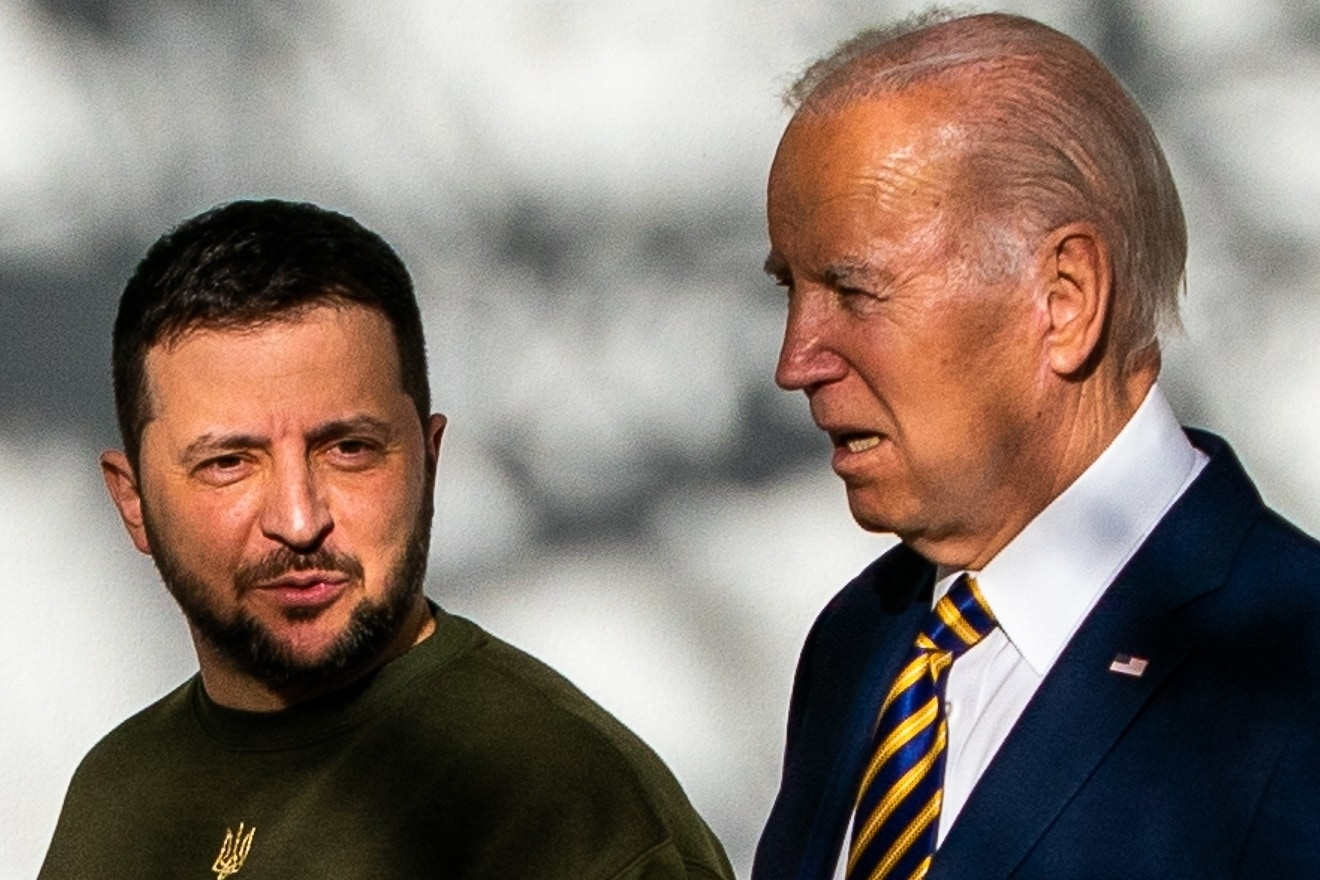President Biden on Thursday asked Congress to approve $20.6 billion in additional funding for Ukraine, as that country’s military struggles to achieve a decisive victory in its counteroffensive against Russia.
In a letter to lawmakers, the White House Office of Management and Budget asked for $13 billion in new military aid and $8.5 billion in additional economic, humanitarian and security assistance for Ukraine and other countries affected by the war. The White House also is seeking more than $12 billion for disaster relief and other emergency domestic funds, including hurricanes, as well as tens of millions of dollars to boost pay for firefighters on the front lines of the wildfires that have hit many parts of the country. In total, Biden is asking Congress for about $40 billion in new spending.
The funding tied to the war in Ukraine — now nearing its 18th month — is likely to prove the most controversial item. The United States has already directed more than $60 billion in aid to Ukraine, including more than $40 billion in direct military assistance. That is more than any other country. Biden has vowed that the U.S. government will support Ukraine “as long as it takes,” but Western allies face difficult questions about the state of the war effort, with Ukrainian forces bogged down the east despite new Western weapons and training. “The administration is requesting supplemental security, economic, and humanitarian assistance funding that would support Ukraine, as well as countries and vulnerable properties worldwide impacted by Russia’s unprovoked and brutal invasion of Ukraine,” Shalanda D. Young, the White House budget director, said in the request. Senate leaders of both parties are expected to support the president’s request. Scores of far-right members in the House of Representatives have made clear that they would oppose any new funding to Ukraine, but a large majority of Republicans still want to ensure that some money is sent to aid Ukraine and NATO allies, particularly ahead of a blistering winter that could slow the counteroffensive even more. “What you hear from lawmakers is: Yeah, we should support this. But there are some already saying ‘no,’ and some saying, ‘This can’t go on forever,’ which is a reflection of the American public,” said Doug Holtz-Eakin, president of the American Action Forum, a center-right think tank.
Ukraine’s government faces a budget deficit of about $40 billion for this year, but that is likely to be mostly covered by aid from Europe, the United States and other organizations such as the International Monetary Fund, according to Oleg Ustenko, an economic adviser to Ukrainian President Volodymyr Zelensky. But that does not resolve what the Ukrainians will do to make up the deficit next year, should the war continue. And tens of billions of dollars in damages to critical infrastructure has gone unrepaired, including for Ukraine’s electrical grid and hospitals. The World Bank has estimated rebuilding Ukraine after the war could cost as much as $350 billion. “There’s still a question mark of what the state of our economy will be next year. If the situation is more or less on the same level as now, we could be required again to need the same budgetary and financial support,” Ustenko said.
Beyond the immediate deficit, Ukraine’s government has an estimated $750 billion in direct economic costs from the war, which could be as high as $1 trillion if indirect costs are added. Ustenko added that Western allies should start transferring billions in frozen assets from Russia’s central bank to Ukraine. Some experts have raised questions about the legality of such a maneuver. “This money should not just be coming from our allies,” Ustenko said. “This money should be coming from the frozen assets of Russia. They have to compensate us. Kremlin is fully responsible for all damage. Therefore even from the point of view of justice, that is very important.” New Russian attacks on Ukraine’s grain exports are compounding the economic challenges. Moscow’s forces have attacked grain storage facilities in July and August, following Russia’s decision to terminate a deal that allowed Ukraine to export grain by sea during wartime. Grain is one of the major Ukrainian exports and a key source of revenue for its government, said Simon Johnson, a professor at MIT who has studied the economic impact of the country’s grain industry. “Putin is playing at the levels of billions of dollars, all trying to convince the West it’s not worth their while to stay with the Ukrainians long enough to evict the Russians from Ukraine,” Johnson said.
It is unclear how the House will handle the Ukraine funding request. The GOP-controlled chamber is already bracing for a major fight over government spending when Congress returns in September, as far-right members continue to push for significant budget cuts. House Speaker Kevin McCarthy (R-Calif.) vowed in June that he would not support any supplemental funding, saying aid for Ukraine should go through the regular appropriations process. Asking to tack on Ukraine funding to a must-pass funding bill would likely only inflame the House Freedom Caucus and its allies further — and they’ve already expressed willingness to shut down the government in pursuit of spending cuts. Republicans can only lose four lawmakers within their ranks to pass legislation through their slim majority without Democrats’ help. Two people familiar with the current thinking among Republican members of the Appropriations Committee, speaking on condition of anonymity to discuss legislative strategy, believe the supplemental request would best be tacked onto another must-pass item: the yearly flood insurance reauthorization program, which could put pressure on Republicans to go along with it rather than deny aid to states affected by disasters this summer.



I’m not pro-Putin and I don’t think most others here are either. At best you could say we critically support what Russia is doing. The keyword here is critical, meaning we recognize the same attributes you are giving to Putin and Russia and we don’t support those. But we do support his current actions vis a vis NATO.
We are communists and we support communist revolutions and communist states.
However, historically, any communist/socialist revolution is quickly besieged and attempted to be destroyed by the Western powers, currently being led by the USA. The US has achieved global hegemony through economic, intelligence and military power projection. So yes, weakening NATO and the US mechanisms of global hegemony do align with our own goals. I guess you could call this “anti-western”, but it’s a vague definition that leaves out a lot of context.
Furthermore, we recognize that Russia is not the cause of this war. The US organized a coup in Ukraine and installed fascists in government with the express intent of provoking Russia into a proxy war as a means of weakening it (famously Adam Shift said in Congress before all this got started, during Trump’s first impeachment over denying arms shipments to Ukraine: “we fight Russia over there so we won’t have to fight it over here”).
When the coup was not enough to provoke Russia, the Ukrainians started bombing East Ukraine and caused Russia to annex Crimea in 2014. A peace accord was signed then which stopped further war (the Minsk Accords) and guaranteed the rights of Russian speakers in East Ukraine. Then Ukraine disregarded this agreement and resumed the bombings in 2016. Before this, Lindsay Graham travelled to Ukraine and met with Azov Battalion leaders, and anticipating a Hillary Clinton victory in US elections told them (on video) “this is the year of offense”.
Finally, when that also was not enough to provoke Russia. NATO tried to induct Ukraine. The Russian response to this (military intervention) is understandable, since that would mean complete encirclement by a specifically anti-Russian alliance.
And lastly, Ukraine is run by Nazis and we won’t support that.
Sorry for the long response, but I hope it answers your question.
While we may fundamentally disagree on the war and its justifications, I do appreciate your thoughtful response, and it does actually answer my question, thank you.